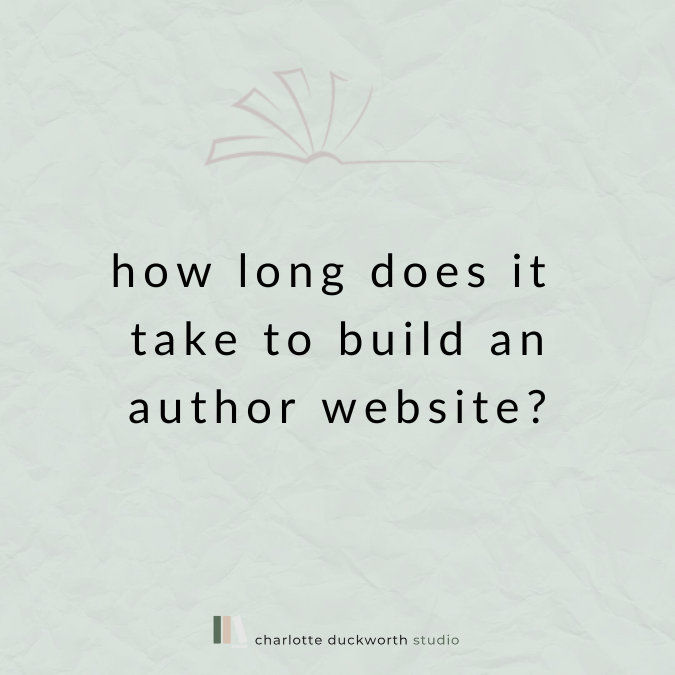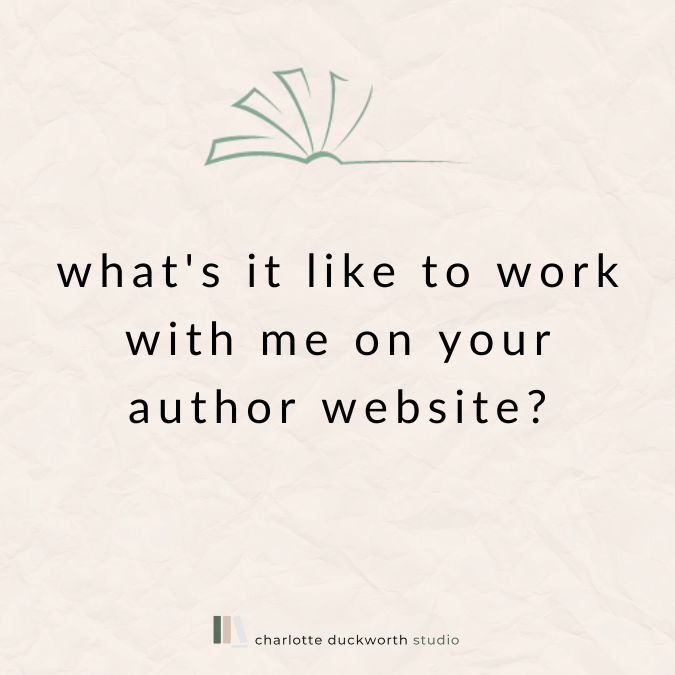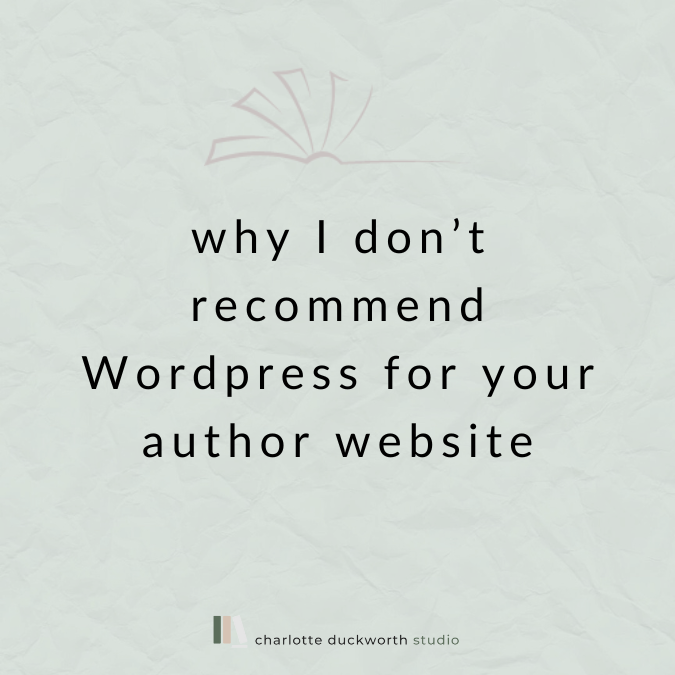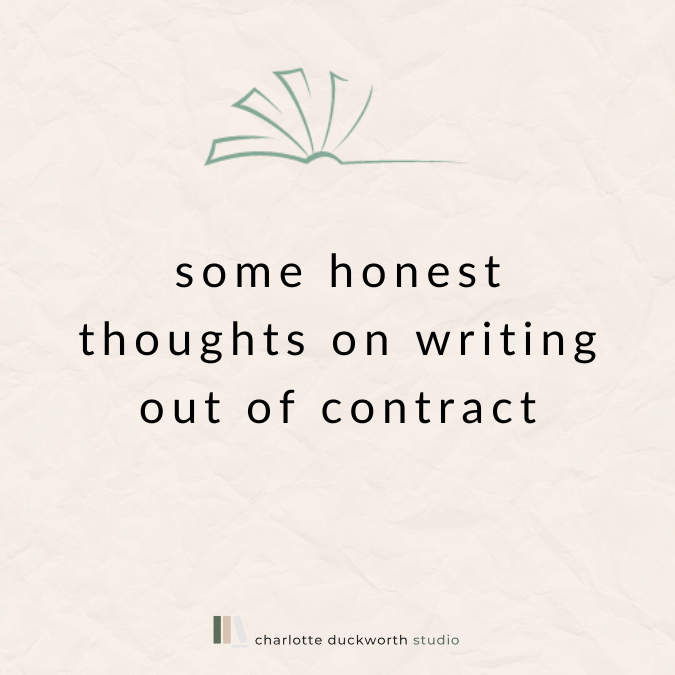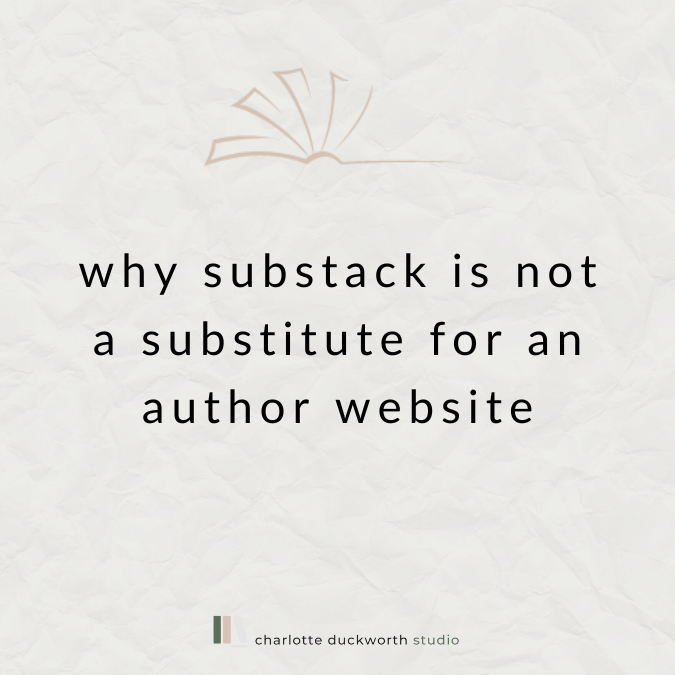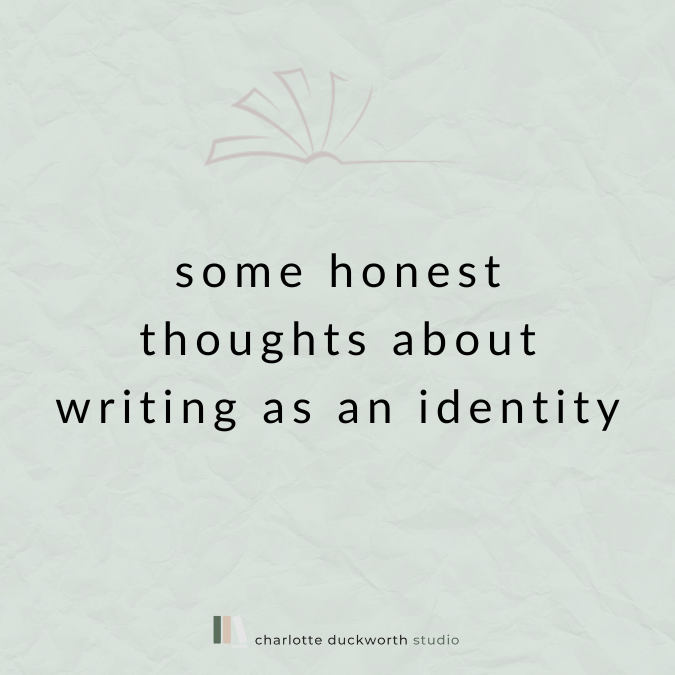How long does it take to build an author website?
There are a lot of factors to consider when building your author website - from which platform to use, to how much you want to spend, and how much content you want to include.
You also need to think about the strategy for your author website - what’s your primary goal for the website (if you’re not sure, may I suggest building your author mailing list?)
I like to break down the process of building an author website into stages. Just like any creative project, it’s important to do your preparation before you start, then the actual building of the website should go relatively smoothly.
3 things to do before building author website →
OK, so without further ado, let’s break down the steps:
Step 1: Outline your goal for the website. Time: 1-2 hours
Many authors I speak to say they want an author website because they’ve just got a book deal and it feels like something they ‘should’ do. They aren’t sure exactly why, but they have a vague notion that it will make them seem more professional (it will!).
Perhaps their publisher has asked them to set one up (I’ve noticed US publishers are more inclined to do this!).
But they don’t really have one defined goal in mind for the site. They’re not really thinking about strategy, and they’re not entirely sure WHY they need a website, or what it should be doing for them.
In those cases I always recommend focusing on building your author mailing list.
Why every author should set up a mailing list →
There really isn’t anything more powerful for an author than having their own list of dedicated fans.
And your author website should be tailored specifically to these people.
Spend a couple of hours brainstorming who your ideal readers are and what you think they’d like to hear from you!
Here are a few prompts to get you thinking about your readership:
What gender is your ideal client?
What age range do they fall into? (this is an important consideration as many older readers don’t use social media, but they are likely to use email)
What level of education have they achieved?
Do they have children?
How much money do they have?
If they do use social media, what platforms are they most likely to be on?
Which websites do they visit the most?
Where do they shop?
Where do they get their book recommendations from?
Where do they buy their books?
Why do they enjoy your books? What is it about them that they enjoy?
Are your readers in book clubs? Where do they like to read?
Do they read your book for pleasure, business, self-help or something else?
Are they busy people, constantly pressed for time, or do they have time to fill?
What other authors do they enjoy reading? And what do those authors’ websites look like?
What other media do your readers enjoy? Podcasts? Newspapers? Magazines?
Once you’ve got a clearer idea of who your ideal readers are, you can work towards tailoring the content of your author website to appeal specifically to them.
This exercise is so helpful in determining what tone of voice to use in the copy on your website, as well as what kind of content would interest them.
Remember: always, always think about your readers. Without them, your career doesn’t exist!
Step 2: Prepare your content. Time: anything from an afternoon to a week, depending on how deep you want to go!
Once you’ve got a clear idea of your ideal reader, it’ll become much easier to tailor the content for the website.
If you’re pressed for time, then my biggest tip is LESS IS MORE!
I feel like I should have this tattooed on my forehead because I repeat it so much.
But honestly, your author website is not another book project. You don’t need to write reams of copy. You don’t need to start a blog.
You just need to have the essential info on each page that readers need to be able to see and digest easily.
If you’re not sure what to include on your author website, you can download my Author Website Content Guide here →
Of course, if you do want to add additional content then that’s brilliant. But if you are a debut author just starting out, then a simple website with all the basic info on will do just as well.
You also need to consider what images to use. You WILL need some images, but you don’t need hundreds.
Again, choose quality over quantity!
I’ve got lots of posts on images to help you with this side of things:
Step 3: Choose your author website platform. Time: a couple of hours (or less than a minute if you trust me!)
The next step is to choose what platform to build the site on.
Now, I’m completely biased and not at all impartial but the answer to this is Squarespace 😆
Why Squarespace is the perfect web platform →
However if you did want to consider other platforms then, unless you are super techy, I always recommend sticking to using a drag-and-drop editor like Wix or Weebly, rather than Wordpress.
I’ve waxed lyrical at length about why I don’t recommend Wordpress for your author website (unless you LOVE tech or you are using the building of your author website as a sneaky procrastination technique to avoid writing your next book and you actively WANT it to take you forever).
There are lots of articles about the benefits of the various platforms online, and I’ve written one myself (link below), but if you want to save time on this step then just pick Squarespace and thank me later.
What’s the best website platform for authors? →
Step 4: Build the site. Time: anything from a day to a month
Now comes the biggest decision of all!
Are you going to build the website yourself, or do you want to pay someone to do it for you?
There are actually three options here, so let me discuss them all in turn.
1. Go down the DIY route
I am actually a huge fan of authors building their own websites - which is why I launched the DIY Author Website Course. I’m an author too and I know how tight money can be - especially when you are just starting out. And there’s something hugely empowering about building your own website!
I also genuinely believe that ANYONE can build their own website.
The technology these days is super straightforward and there’s tons of free, helpful information out there on the interest to guide you.
However, you do need two things: TIME and PATIENCE.
It will inevitably take you longer to build your own author website if you have never built a website before.
There’s a steep learning curve with even the most basic of website platforms, and I’d suggest setting aside a couple of days at least to get to grips with whichever platform you choose.
Once you’re confident with the technology, then it does get quicker - and I’d expect someone with no experience whatsoever to be able to build their own author website from scratch in around a fortnight.
You can speed this up by taking my aforementioned course - I had one student of the course tell me he bought it then completed his website within a single weekend!
2. Use a template
A sort of halfway-house between DIYing your site and paying someone else to design it for you, template shops are all the rage in the website world.
Here, you pick a template you like the look of, pay to download it, then swap out the pre-populated content for your own.
This can definitely save you time - you won’t have to set up any of the design settings (fonts, colours etc) as these will already be plugged in for you.
However, it’s still a very hands-on way of building your website, and you will still need to get to grips with the platform you have chosen.
You do also have the drawback of trying to fit your content into a design that wasn’t specifically tailored for it - which can end up with some amateurish results.
You also run the risk of having a website that looks like lots of other people’s!
Squarespace itself offers a bunch of predesigned templates that you can use as a kick-off point, but sadly none of them are particularly well tailored for authors.
Still, if you like the idea of the tech side of building a website, but are less keen on the design side, then buying a readymade template can be a really good option.
Here are a couple I highly recommend
Christy Price (please note this is an affiliate link)
3. Last but never least - you can pay a custom designer
This is clearly the most expensive option, but will often work out to be the quickest and easiest!
How long it will take a professional website designer to build your website completely depends - some designers (like yours truly) work with just one client at a time and can therefore build author websites in just one day, others take on multiple clients at once resulting in a longer process - anything up to six weeks is common.
You will also need to bear in mind the availability of the designer.
Very few good designers will have immediate availability (unless they’ve had a cancellation), meaning that you may need to wait a month or two to get a slot.
It’s always good to start thinking about your author website at least 3-4 months before your book is due to come out. Longer is even better.
That way, whether or not you’re building the site yourself, or using a designer to do it for you, you’ll have plenty of time and won’t be in a panic.
Conclusion
I hope this guide has given you a rough idea of just how long it takes to build an author website!
As you can see, there’s a lot that goes into the process even before you get to things like registering your domain name and adding content to pages.
But if you want to save time and have a friendly face to guide you through the process, then take a look at my Author Website in a Day package, and get in touch - I’d love to help you!

